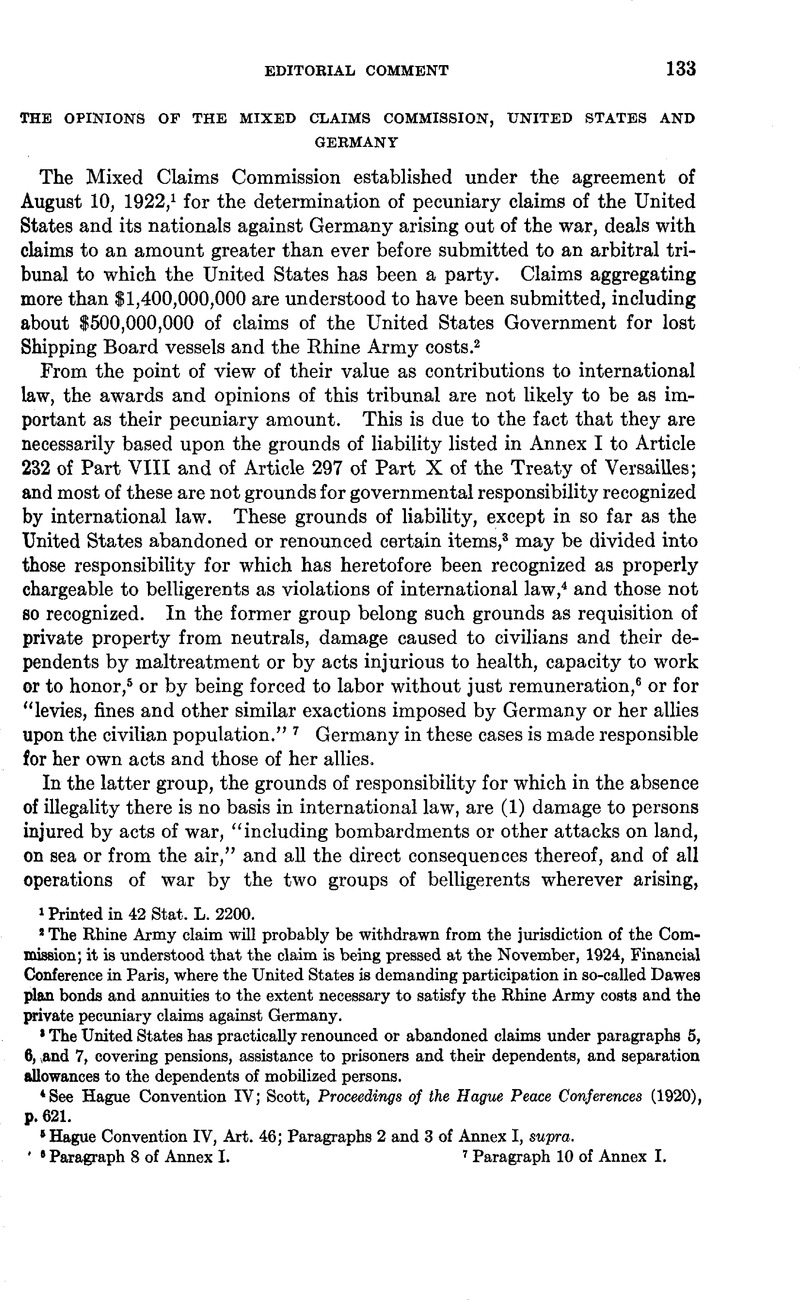No CrossRef data available.
Article contents
The Opinions of the Mixed Claims Commission, United States and Germany
Published online by Cambridge University Press: 04 May 2017
Abstract

- Type
- Editorial Comment
- Information
- Copyright
- Copyright © by the American Society of International Law 1925
References
1 Printed in 42 Stat. L. 2200.
2 The Rhine Army claim will probably be withdrawn from the jurisdiction of the Commission; it is understood that the claim is being pressed at the November, 1924, Financial Conference in Paris, where the United States is demanding participation in so-called Dawes plan bonds and annuities to the extent necessary to satisfy the Rhine Army costs and the private pecuniary claims against Germany.
3 The United States has practically renounced or abandoned claims under paragraphs 5, 6, ,and 7, covering pensions, assistance to prisoners and their dependents, and separation allowances to the dependents of mobilized persons.
4 See Hague Convention IV; Scott, Proceedings of the Hague Peace Conferences (1920), p. 621.
5 Hague Convention IV, Art. 46; Paragraphs 2 and 3 of Annex I, supra.
6 Paragraph 8 of Annex I.
7 Paragraph 10 of Annex I.
8 Paragraph 9 of Annex I. Opinions of the Mixed Claims Commission, United States and Germany, p. 3, hereafter cited as Op. Com. The opinions are numbered consecutively, and will be cited by page number.
9 Op. Com., p. 76. The opinions of the Reparation Commission differ occasionally in their interpretation of the treaty from those of the Mixed Claims Commission. The Reparation Commission has jurisdiction of damage claims under Arts. 231, 232 and Annexes, whereas the mixed arbitral tribunals between Germany and the several Allied countries have jurisdiction of claims for injury to “property, rights and interests” under Arts. 296, 297 et seq., and Annexes. The Mixed Claims Commission, United States and Germany, has jurisdiction over both classes of claims.
10 Op. Com., p. 2 (November 1, 1923).
11 Op. Com., p. 12 (November 1, 1923).
12 “The simple test to be applied in all cases is: has an American national proven a loss suffered by him, susceptible of being measured with reasonable exactness by pecuniary standards, and is that loss attributable to Germany’s act as a proximate cause?” Op. Com., p. 13.
13 The latter embrace in general the categories mentioned as sources of decision in Article 38 of the Statute for the Permanent Court of International Justice, namely, international conventions, international custom accepted as law, rules of law common to both Germany and the United States, the general rules of international law, judicial decisions, and the teachings of the most highly qualified publicists as subsidiary means for the determination of law; but no particular code or rules of law bind the Commission.
14 Administrative Decision, No. V, Op. Com., p. 191.
15 There seems no very sound reason for reserving from this rule (Op. Com., p. 8) the claims of citizens of the Virgin Islands who, when injured, were citizens of Denmark and who, by the acquisition of the islands by the United States, became American citizens. This mode of collective naturalization is as effective a naturalization as any other, and the claimant should be deemed to fall within the rule that “while naturalization transfers allegiance, it does not carry with it existing state obligations” (Op. Com., p. 8).
16 Administrative Decision, No. V, Op. Com., p. 186.
17 Op. Com., p. 61 (December 11, 1923).
18 Op. Com., p. 141 (October 2, 1924).
19 Op. Com., p. 145 (October 21, 1924).
20 (1890) 133 U. S. 514.
21 Op. Com., p. 187.
22 The rule that foreign offices drop claims when they cease to be national is due to the fact that they then cease to be inter-national as between the two countries, and prosecution of foreigner’s claims would disturb rather than promote good relations.
23 The Western Maid (1922), 257 U. S. 419, 433.
24 It does not seem to be certain that a claim passing from American ownership after November 11, 1921, would be without any relief, diplomatic or otherwise, for example, before the Reparation Commission or national claims courts, like that of Belgium.
25 It will be interesting to observe what the Department of State will do with awards paid by Germany and accruing to German, British and other alien claimants.
26 Op. Com., p. 17 (November 1, 1923); it has not yet been decided whether the American dependents of aliens killed on the Lusitania are rightful claimants.
27 Op. Com., p. 75 (March 25, 1924)
28 Report, Vol. 5 (1923), p. 49.
29 The Atlanta (1818, U. S.) 3 Wheat. 409; Britain Steamship Co. v. The King, [1919] 1 K. B. 575.
30 See Hyde, International Law, Vol. II, sees. 74, 743; Yale Law Journal, Vol. 33, p. 439.
31 Report of the Secretary of the Navy (1917), pp. 3, 7; ibid. (1918), p. 30.
32 Op. Com., p. 78.
33 Op. Com., p. 33 (November 1,1923). A special war risk premium claim, arising out of a special case due to the submarine menace off the New England coast in 1918, was not distinguished from the principal opinion. Op. Com., p. 71. See also Yntema, “The Treaties with Germany and Compensation for War Damage,” (1923), 23 Columbia Law Review 511; (1924), 24 ibid. 134.
34 Op. Com., p. 103 (April 17 and September 18, 1924).




